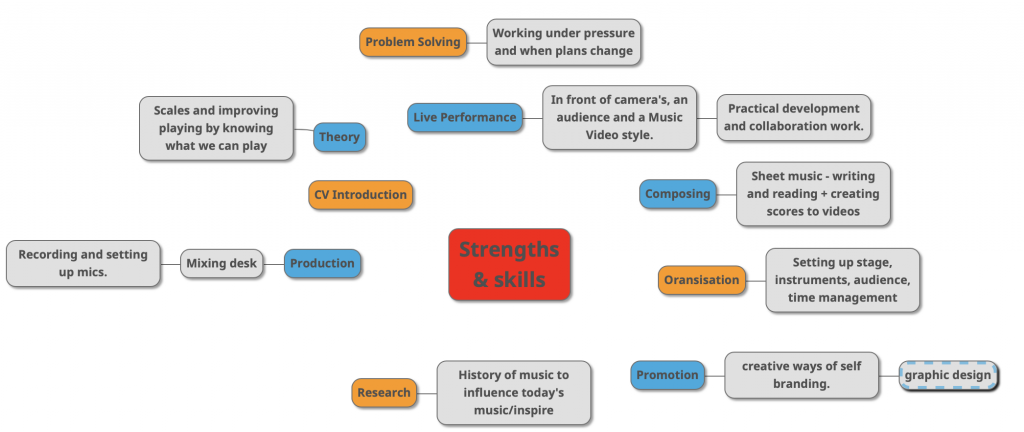
This mind map is a visual representation of all the skills we have learnt over the time we’ve been at college.
We’ve learnt about production using Logic and Sibelius. We also learnt about how to record live sound by learning how to set up mics for each instrument into the stage box and then we learnt how to set up live sound using the mixing desk and speakers etc. This is really useful because it means that we know how to use some production apps so we can buy them ourselves and start producing at home. Within the production sessions, we learnt about components like reverb so we can create professional tracks.
We began to learn about music theory, which was really helpful when it came to improvising and creating our own music. We learnt about the circle of fifths, how to formulate chords and scales in major and minor keys. Then, we learnt different techniques that we can use to make our playing more interesting, like arpeggiation, flattening the third and even playing sevenths. I found this really helpful because when I come up with a chord progression that I’m happy with, I have so many places to take it to finish the song and bring it new life. When playing other songs, I’ve found that I can make them sound so much more expressive now that I know more theory.because it means I can add little runs from the scale of the key etc so it’s made more personal.
Throughout the course, there have been many different kinds of problems that we’ve learnt to fix. This was really great to know because in the industry, there’s always so many problems that can happen so to be able to creatively fix it is a skill that is really needed. For example, when we were doing band work, it was difficult to pick songs that everyone was happy with so there had to be compremisation to make it fair. Another time, we didn’t have a singer to work with so we were quite unprepared but we still did our best with individual practice and went on and it turned out to be good.
One of the more important skills we learnt was our performance skills. We’ve performed in from of camera’s, small audiences and slightly larger audiences and I think that worked out really well because it means we’ve had experience in a lot of different settings. The camera one’s were probably the hardest ones but I learnt that the camera loves emotion more than a crowd so just feel to music and it’ll look good. During the live shows, the love a show so moving around and having a good time is key.
Composing and creating was a skill we’ve rounded out. We’ve had the opportunity to work in many different genres and look at how they formulate the songs, like how the drum beat differs etc. I think this was really good to know because when we create our own tracks, we have an idea of what genres hold what components in, like jazz has quite a lot of scale kind of piano with sevenths chords etc. I think it widened our playing too.
Organisation was a big thing. We pretty much always had more than one thing that we needed to be prepared for which meant there was a lot to balance out. However, I think this was perfect practice for the industry because musicians are always performing and writing and learning so you have to find that perfect balance between it all. It was a difficult skill to keep up with but it was really important to learn.
Promotion is probably one of the most looked over skills so I’m really glad we had some time to look at promotion. Promoting yourself is so important to draw in your audience and I think we were shown a lot of creative ways to brand ourselves, like with business cards and websites as well as posters and social media.
We learnt a lot of history of music and how different genres actually came about and which artists dominated them. I think this was really interesting and it gave me a lot of new artists to listen to and really feel where their music was going, like with Stevie Wonder and Miles Davis etc. Learning the history of music really helps you understand where the piano and wind instruments etc come from and you just get to feel the music deeper which helps when you’re trying to produce your own track in that genre.
